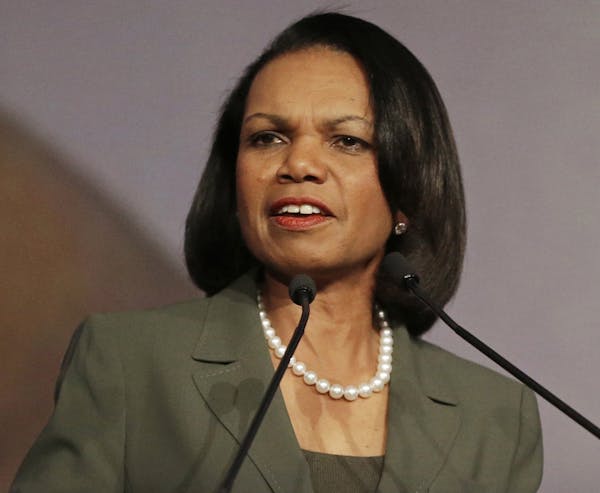In his speech accepting the Democratic presidential nomination in 1968, Vice President Hubert Humphrey said, "Winning the presidency for me is not worth the price of silence or evasion on the issue of human rights." His words likely reflect Minnesota's historical aspiration of cherishing and respecting human rights and dignity for all.
As former Secretary of State and National Security Adviser Condoleezza Rice prepares for her speech at the University of Minnesota today, she would do well to consider many in our state who long believe there is a serious price to be paid when our government fails to face up to egregious human rights violations.
Among those violations are official policies of torture and cruelty once authorized by the U.S. government while Rice, as one of President George W. Bush's closest confidants, served as his national security adviser in the White House. In this capacity, she oversaw the National Security Council when the Central Intelligence Agency (CIA) sought approval for the use of specific interrogation techniques. These policies were in direct contravention of U.S. and international laws and obligations prohibiting torture. Their consequences have been far-reaching, severely impacting the rule of law, national security and our international standing.
To date, Rice has been less than forthcoming about her own role in these momentous and dreadful decisions. In some instances, she misstated claims about the use of torture and was criticized by human rights groups for doing so.
Rice's address at the university, which has generated controversy both on and off campus because of the Bush administration's torture program, provides an opportunity for her to clarify her position and actions during that shameful period in our nation's history.
Rice needs to answer whether or not she recognized the enormous damage caused when the government descended into torture. She should explain her reasoning on how the use of torture squares with U.S. international commitments under the U.N. Convention against Torture and Other Cruel, Inhuman or Degrading Treatment or Punishment, which she was duty and legally bound to uphold.
These and other ongoing questions about the U.S. torture program are among the reasons why the Center for Victims of Torture has been diligently pursuing the facts surrounding the past use of torture and cruelty. It is our view that such information is essential to closing the door to the return of these abuses in the future. There also needs to be accountability for those individuals responsible for authorizing and engaging in torture. They should be held accountable for the crimes that were committed.
Although we commended President Obama for issuing an executive order banning the use of torture, we have criticized the Obama administration for thwarting efforts to secure accountability for torture and for failing to close gaps in U.S. law that could again allow for torture to be committed by U.S. personnel.
Thankfully, on April 3, the U.S. Senate Select Committee on Intelligence, in a swift and decisive 11-3 vote, approved declassifying the executive summary, findings and conclusions of its 6,000-page report on the CIA's post-9/11 detention and interrogation program. The CIA program was home to systematic torture, including waterboarding, and the notorious secret "black sites" around the world where torture was widely used.
It is absolutely critical for the executive summary, findings and conclusions of the report to be declassified and released by the Obama administration with as few redactions as possible and as soon as possible. The president has indicated that he supports doing so, and he should direct his subordinates to make it happen without delay.
Several members of Congress, including Rep. Keith Ellison, DFL-Minneapolis, have urged the president to declassify. We hope all members of the Minnesota congressional delegation will join in these calls and will also agree with the Star Tribune, which wrote in regard to the CIA torture report: "It's time for transparency, and for America to live up to its values."
The United States can regain its global leadership against torture, but we must first begin with the full knowledge and public acknowledgment of the mistakes of the past.
Curt Goering is executive director of the Center for Victims of Torture in St. Paul.
How 'the Squad' and like-minded progressives have changed their party
Protect kids online


